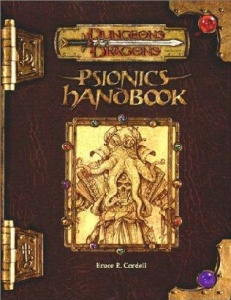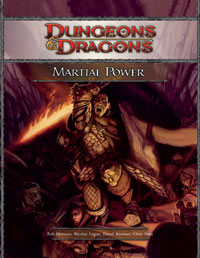In the Dungeons & Dragons fantasy role-playing game, psionics are a form of supernatural power similar to, but distinct from, arcane and divine magic. Psionics are manifested purely by mental discipline. Psionics were introduced in the original supplement Eldritch Wizardry. Psionics have appeared as part of the core rules beginning with Advanced Dungeons & Dragons 1st edition.
The magic in Dungeons & Dragons consists of the spells and magic systems used in the settings of the role-playing game Dungeons & Dragons (D&D). D&D defined the genre of fantasy role-playing games, and remains the most popular table-top version. Many of the original concepts have become widely used in the role-playing community across many different fictional worlds, as well as across all manner of popular media including books, board games, video games, and films.
The druid is a playable character class in the Dungeons & Dragons fantasy role-playing game. Druids wield nature-themed magic. Druids cast spells like clerics, but unlike them do not have special powers against undead and, in some editions, cannot use metal armor. Druids have a unique ability that allows them to change into various animal forms, and various other qualities that assist them in natural settings.

The Epic Level Handbook is a rule-book by Wizards of the Coast for the 3rd edition of Dungeons & Dragons. The book was published in July 2002, and contains optional game rules for playing characters who have reached a higher experience level than is covered in the standard rules. This is referred to in the book as "epic level" play.

Complete Arcane is a supplemental rulebook for the 3.5 edition of the Dungeons & Dragons role-playing game. It expands upon and replaces an earlier soft-cover rulebook entitled Tome and Blood.

Complete Warrior is a supplemental rulebook for the 3.5 edition of the Dungeons & Dragons role-playing game, published by Wizards of the Coast. It replaces and expands upon an earlier rulebook entitled Sword and Fist.

Complete Adventurer is a supplemental hard-cover rulebook for the 3.5 edition of the Dungeons & Dragons game system published by Wizards of the Coast.

Complete Divine is a supplemental rulebook for the 3.5 edition of the Dungeons & Dragons fantasy role-playing game published by Wizards of the Coast. It replaces and expands upon earlier rulebooks entitled Masters of the Wild and Defenders of the Faith, as well as being a catchall for anything that does not fit into Complete Adventurer, Complete Arcane, Complete Warrior, or Complete Psionic.
A character class is a fundamental part of the identity and nature of characters in the Dungeons & Dragons role-playing game. A character's capabilities, strengths, and weaknesses are largely defined by their class; choosing a class is one of the first steps a player takes to create a Dungeons & Dragons player character. A character's class affects a character's available skills and abilities. A well-rounded party of characters requires a variety of abilities offered by the classes found within the game.
The monk is a playable character class in most editions of the Dungeons & Dragons fantasy role-playing game. A D&D monk is a fantasy martial artist, specializing in unarmed combat.
The warlock is a character class in the Dungeons & Dragons fantasy role-playing game. It was introduced as a non-core base class who practice arcane magic in the supplemental book Complete Arcane for the 3.5 edition of Dungeons & Dragons. In 4th and 5th edition, the warlock is a core class.

Complete Mage is a supplemental rule book for the 3.5 edition of the Dungeons & Dragons role-playing game. It is effectively the sequel to Complete Arcane.

Complete Champion is a supplement for the 3.5 edition of the Dungeons & Dragons fantasy role-playing game.

The Psionics Handbook is a sourcebook published by Wizards of the Coast in 2001 for the 3rd edition of the Dungeons & Dragons fantasy role-playing game. It contains a multitude of rules and options for integrating psionic powers into the D&D game.

Martial Power is a supplement for the 4th edition of the Dungeons & Dragons fantasy role-playing game. It contains additional options and rules for fighters, rangers, rogues, and warlords, including new builds for each class to further customize a character, such as the "beastmaster ranger," "bravura warlord," and "resourceful warlord".

Dark Sun is an original Dungeons & Dragons (D&D) campaign setting set in the fictional, post-apocalyptic desert world of Athas. Dark Sun featured an innovative metaplot, influential art work, dark themes, and a genre-bending take on traditional fantasy role-playing. The product line began with the original Dark Sun Boxed Set released for D&D's 2nd edition in 1991, originally ran until 1996, and was one of TSR's most successful releases.

Divine Power is a supplement for the 4th edition of the Dungeons & Dragons fantasy role-playing game.

Primal Power is a supplement to the 4th edition of the Dungeons & Dragons role-playing game.

Martial Power 2 is a supplement published by Wizards of the Coast (WotC) in 2010 for the 4th edition of the Dungeons & Dragons fantasy role-playing game. The book is a sequel to 2008's Martial Power; like its predecessor, Martial Power 2 provides new options for four specific character classes, as well as some general martial variants.

Psionic Power is a supplement to the 4th edition of the Dungeons & Dragons role-playing game.














